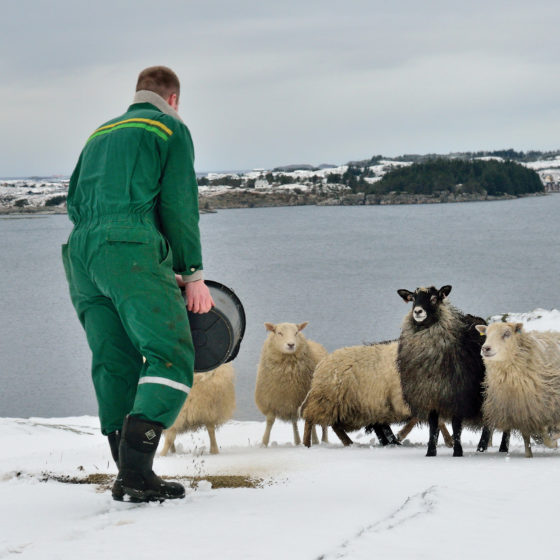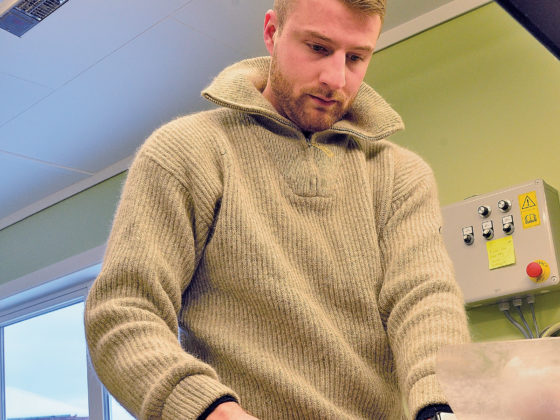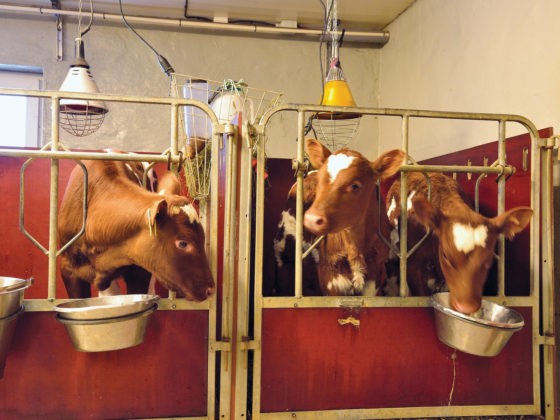The hens don’t know if it is Sunday or Monday. They produce their eggs every day, all year round. And one of the cows hadn’t noticed that it was Christmas Eve when she gave birth to her new calf. Being a farmer is more than just a job – it’s a lifestyle.

Ready
Trond Helland is ready with documentation for what is a brand-new course for officers who be assigned extended responsibility for IT and data infrastructure on board.
It is Saturday and we are sitting in the kitchen as we meet Anderas Breivik at his parents’ home close to Herdlevær in Øygarden, west of Bergen. There is snow on the ground and the light is extraordinary, as it always is in Øygarden – this enormous breakwater outside Bergen. Here there are no mountains blocking out the light or stopping the rain – just some small hills, trees and the North Sea outside the living room.
However, fossil-based civilisation is just a few hundred meters away, represented here by Kollsnes, which is one of the largest gas processing plants and pumping stations in the world.
The gas sent from here to the European continent is equivalent to three times all the hydropower production in Norway.
You cannot see it or hear it from the Breivik’s farm. Here the wind and some noise from the “wild sheep” dominate the soundscape – and now and then the sound of a tractor. People are working here.
Cultivated wilderness
Anderas Breivik is fascinated by the resilience of the surrounding countryside – the fields that rest in the winter and provide them with the best grass for livestock in the summer, the fresh air, the strong light and the ocean.
Rooted
“I love life in the city, but this is where I belong,” says Andreas Breivik.
Digital cowshed
An automatic milking machine does the work of getting fresh milk from the cows every five to seven hours. The computer provides the cows with concentrates and records how much milk each cow produces. The digital cowshed has been a reality for years.
“We have been farming here for generations. My grandmother lives in the house next door and my cousins live nearby. Even though I have a flat of my own in Bergen, I come back home just about every weekend to help my mother and father with production and farming,” explains Andreas Breivik. For a city boy, the word “production” sounds rather industrial and not at all associated with the romance of “living on a farm”, but production is still a relevant expression.
“We have some 7,400 hens in a huge henhouse where they can walk around, and a daily production of some 7,200 eggs a day. The hens leave their eggs in a cave which is kept dark, because they only lay in darkness. As soon as the egg has been laid, a door opens and the hen walks out. The egg is carefully transported to a store room. We have to check each egg, and some have to be rejected due to size (they may be too large, often containing two yolks) and some have to be washed. An automatic system takes care of the rest. Once a week a truck comes and picks up five pallets of eggs.”
That’s a lot of eggnog! “Yes, but hopefully not. We deliver to Nortura, which is a major player in the egg and chicken business. Our egg production facilities have been developed over three generations.
My mother and father expanded the henhouse some years ago in order to make a better living out of it. We cannot go into the space where the hens live due to the risk of transmitting bacteria or viruses, but the building is pretty much equipped with state-of-the-art production facilities. We use light to manage production, creating a rhythm that separates day and night for them. It works very well, and the eggs taste really good!”
The gas sent from here to the European continent is equivalent to three times all the hydropower production in Norway.
You cannot see it or hear it from the Breivik’s farm. Here the wind and some noise from the “wild sheep” dominate the soundscape – and now and then the sound of a tractor. People are working here.
Andreas Breivik is planning to go into higher education in one of the maritime fields, but he admits he is very much attached to the farm and the countryside. “Over the years my family has developed the fields around here. New plans are now being putting into place as we will be getting some 50 new houses close to our neighbourhood.
We are working with the developer and relocating stones and soil to expand our fields near to us. Here we have 38 sheep that are strong enough to be left out all year round, and from spring to late autumn we have 17 cows on the fields around us. In the winter time we keep them indoors, of course. And we currently have seven calves. We got two on Christmas Eve, and last weekend I helped to deliver another one. That’s how it is on a farm,” Andreas explains. “We’d love to have more cows, but we don’t have enough space outside for more. Maybe we can have some more now that we are expanding our green field area.”
You work as a trainee superintendent with Seatrans Ship Management.
The idea of becoming a farmer…. have you caught the bug?
“Of course. We’ll see. My roots are here. I enjoy life here, with my family, my friends and the countryside, the sea right outside. I love to go out fishing, even if there were more fish back in the day (as most fishermen say…), but catching lobster in October or getting a fresh cod… It’s a good life, but being a farmer is far more than just a job.
It’s harvesting what nature creates, and you have to help and take care of nature if you want to bring in a good harvest. Running a farm is like developing a heritage for yourself and the next generation. My first plan, however, is to expand my formal skills in the maritime field. I am grateful for how I’ve been treated in Seatrans, by the pleasant and inclusive people there and especially by my mentor at the office we share, Jon-Atle Aarland.





